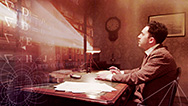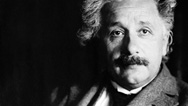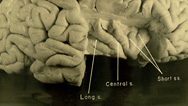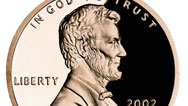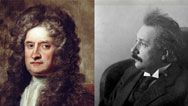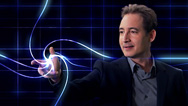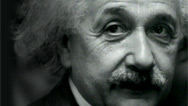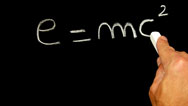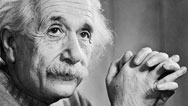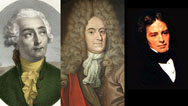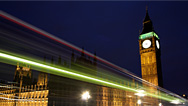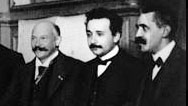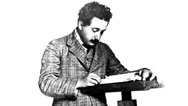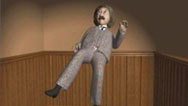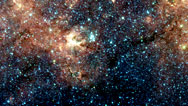
Einstein Revealed
A two-hour special revealing the hidden life of Albert Einstein and tracing the birth of his groundbreaking ideas Airing September 9, 1997 at 9 pm on PBS Aired September 9, 1997 on PBS
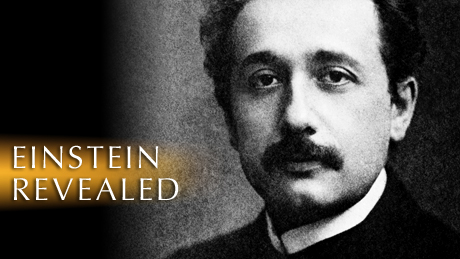
Program Description
Transcript
Einstein Revealed
PBS Air date: September 9, 1997
ANNOUNCER: Tonight, on NOVA, his name is synonymous with genius. Albert Einstein illuminated the most fundamental scientific truths of his time and became an international celebrity. But what of the private man behind the public hero? Newly discovered letters shed light on his bold thought experiments and forbidden loves. A two hour NOVA special: Einstein Revealed.
ALBERT EINSTEIN (ACTOR ANDREW SACHS): I was 16 when the image first came to me. What would it be like to ride a beam of light? At 16, I had no idea, but the question stayed with me for the next ten years. Simple questions are always the hardest, but if I have one gift, it is that I am as stubborn as a mule.
F. MURRAY ABRAHAM (NARRATOR): Albert Einstein once said that he spent his whole life trying to understand the nature of light. More than any other scientist, he succeeded. In 1932, Einstein was 53 and at the height of his fame. But there was another private Einstein whose thoughts and feelings have only recently come into view.
ALBERT EINSTEIN (ACTOR ANDREW SACHS): My Dear Dolly, How was I able to live alone before I met you? Without you, I lack self-confidence, passion for work, enjoyment of life. In short, without you, my life is no life.
F. MURRAY ABRAHAM (NARRATOR): This is the Einstein that we know: the wise old man, the other-worldly genius. But new revelations from his papers, notebooks and love letters have finally illuminated the younger man whose discoveries about light, space and time have transformed our view of the universe. Albert Einstein was born in 1879 in the south German market town of Ulm, the first child of upwardly mobile Jewish parents. German Jews had just received the right to own land, access to higher education and the chance to engage in a wide range of careers. Albert and his sister, Maja, enjoyed a comfortable childhood. Pauline Einstein was cultivated and ambitious, with a touch of the ruthlessness that her son Albert would later exhibit. She encouraged her husband, Hermann, a featherbed merchant, to pursue new business opportunities, while he gave the young Albert his first taste of the wonders of science.
ALBERT EINSTEIN (ACTOR ANDREW SACHS): I must have been four or five when my father showed me a compass. You see the needle always points in one way no matter how I turn the compass. When I saw this for the first time, the fact that it behaved in such a fixed way changed my understanding of the world. Until then, I thought that one thing had to touch another to make it move. But at that moment, I realized that something deeply hidden had to lie behind things.
F. MURRAY ABRAHAM (NARRATOR): That mysterious something was called electromagnetism. Its discovery as a fundamental force of nature was the greatest breakthrough of 19th century physics. Within decades, it produced a technological revolution. Throughout Germany, the change from gas lighting to electricity was in full swing. Hermann Einstein set his sights on this booming new market, so he moved his family to Munich to manage a factory that manufactured dynamos. Albert grew up surrounded by electricity, both its machinery and its mystery.
JURGEN RENN: He was surrounded by people who would love to explain how things worked to him. He had uncles, there were visitors coming to the family who would introduce him also into the knowledge connected with the technology. So he got a very early introduction in what would become the key topics of his later science. Electromagnetism was the family business, and electromagnetism became the central topic of Einstein's later research.
F. MURRAY ABRAHAM (NARRATOR): As a boy of ten, Einstein plunged voraciously into a program of self-education. He read Euclid, taught himself geometry and immersed himself in every popular book on science he could find. Albert never minded studies, it was school he hated. He detested the regimentation characteristic of German education, and of so much of German society. By the time he reached high school, he dreaded the inevitable sequel: conscription into the German army. In 1894, his family moved to Italy, leaving Albert alone in Munich to complete the school year. Overwhelmed by competition in Germany, Hermann Einstein had shifted his factory to Pavia. Lonely and isolated, Albert lasted less than a term on his own.
ALBERT EINSTEIN (ACTOR ANDREW SACHS): I hated my school in Munich, the rigid discipline, the worship of authority, the school masters strutting around like officers whipping the troops into shape. I searched for a way out until finally it came to me: The next time the teacher scolded me, I went to my family doctor and obtained a certificate—It seems I was suffering from ... nervous exhaustion, and needed to leave immediately!
F. MURRAY ABRAHAM (NARRATOR): He escaped Munich, bound for Italy.
ROBERT SCHULMANN: He probably didn't even announce that he was coming, so I can see him turning up on the doorstep of his parents in Pavia and saying, "Well look, I made a go of it in Germany, but don't worry about it, I'm not going to become a bum. I have a plan and here's what I'm going to do." The degree of independence for someone at the age of 15 is really astonishing.
F. MURRAY ABRAHAM (NARRATOR): Einstein's plan was to forego high school and take the entrance exam to the Swiss Polytechnic, one of Europe's top technical universities. While waiting for his results, he enjoyed an extended break in Pavia. One of his sister's friends reported that he spent his time walking and cycling constantly, often daydreaming, always thoughtful. And free of the demands of school, Albert could learn about electricity first-hand in his father's factory.
ROBERT SCHULMANN: I think the fact that Einstein could get his hands dirty in the factory was, is an important thing that's often overlooked. He had in his father and uncle's factory in Pavia a wonderful laboratory, if you will a playground. We see the Einstein who is the great theoretician who only needs his pencil and paper. But working the dynamos certainly had a fascination for him and was an important element, I think, also in the way Einstein did his science, which is to visualize how things work.
F. MURRAY ABRAHAM (NARRATOR): But Albert was still a drop out with no high school diploma and no nationality, for he had renounced German citizenship to avoid military service. So when he failed the arts portion of the Swiss University exam, Albert gave in to his father's demands that he complete high school in the Swiss town of Aarau. It seemed a setback, but as it turned out, it was here that Einstein first experienced what it might mean to be a scientist.
ROBERT SCHULMANN: He has this great stroke of luck that he comes into an excellent school system with a new physics laboratory. So it's the combination now of some kind of orthodox training combined with the playfulness he's already exhibited and which isn't stifled in Aarau, that I think makes it such an important part of his development as a scientist and as a person.
F. MURRAY ABRAHAM (NARRATOR): In the laboratory, Einstein first came to grips with the physics that lay behind the electrical devices with which he was already familiar. He hooked compass needles to batteries and wires to prove to himself the fact discovered earlier in the century that electric currents can induce magnetic fields, and that the two were both aspects of the same phenomenon called electromagnetism. With a simple bar magnet, Einstein explored the patterns formed by a handful of iron filings, swept up by the lines of force created in a magnetic field. And when he was taught that light itself is an electromagnetic wave travelling through space, Einstein had found his life's work.
ALBERT EINSTEIN (ACTOR ANDREW SACHS): That was when it came to me, that image of riding a beam of light.
F. MURRAY ABRAHAM (NARRATOR): This was the first of Einstein's famous thought experiments. He created these deceptively simple scenarios to explore the most complex concepts. If light were a wave, Einstein reasoned, then no matter how fast it travels, it ought to be possible to catch up to its peaks or valleys. But then, Einstein wondered, what would he see? Would the light stand still? Would time stand still? Would he ride that same peak of light forever, a glimpse of one frozen instant? At 16, Einstein could not find the answers to his questions. He was not yet a trained scientist, but this he knew was a puzzle worth his talents. But as his year in Aarau came to an end, he had to turn his thoughts to practical concerns.
ALBERT EINSTEIN (ACTOR ANDREW SACHS): Now let me see. Oh yes. Yes, here it is, my final exam essay. My plans for the future. At University, I plan to study mathematics and physics. I suppose I will become a high school teacher of the theoretical parts of the sciences. Here are the reasons for my individual inclination for abstract and mathematical thinking and my lack of imagination.
F. MURRAY ABRAHAM (NARRATOR): For all that alleged lack of imagination, the 17-year-old posing for his high school graduation photograph displayed an easy confidence. From Aarau, Einstein enrolled at the ETH, the Federal Polytechnic in Zurich, one of the leading technical institutes in Europe. Its laboratories were second to none. Einstein admitted that he could have gotten a first class education there, but that would have required regular attendance in class. And Einstein preferred to spend his time at his favorite haunts, including the Odeon Cafe, which remains largely unchanged to this day.
ALBERT EINSTEIN (ACTOR ANDREW SACHS): It's nothing short of a miracle that the modern methods of instruction have not yet entirely strangled useful curiosity. For this delicate plant, aside from stimulation, stands mainly in need of freedom.
F. MURRAY ABRAHAM (NARRATOR): Einstein would stay in the cafes for hours, sipping coffee and talking with his classmates, among them, two who would become lifelong friends: Marcel Grossman and Michele Besso. And there was a third, the one woman in Einstein's course. She quickly caught his eye.
ALBERT EINSTEIN (ACTOR ANDREW SACHS): February, 1898. Esteemed Miss, the desire to write to you has finally overcome the bad conscience that made me avoid exposing myself to your critical eyes.
F. MURRAY ABRAHAM (NARRATOR): Her name was Mileva Maric. She had come from Hungary to the ETH, one of the few European universities open to women.
FRANCOISE BALIBAR: Being bright at school, she was taught by her teachers to go further. First she went to a boys school, because of course the boys could go further than girls at that time. And then, I think she was rather lucky, because some of her teachers told her that a school was opening in Zurich where girls were admitted, which was quite unusual at that time.
F. MURRAY ABRAHAM (NARRATOR): At the ETH, Mileva was enrolled in the physics teaching course, as was Einstein. She projected an air of independence and intelligence that he found highly appealing.
FRANCOISE BALIBAR: She probably was a kind of realization of a dream for him, because she was free. She had no family on her back. She had to take care of herself by herself. In a sense, she was freer than he was.
F. MURRAY ABRAHAM (NARRATOR): Gradually, Albert and Mileva came to feel that they were two of a kind.
ALBERT EINSTEIN (ACTOR ANDREW SACHS): August, 1899. How closely our mental and physiological lives are linked. We both understand each other's black souls so well, not to mention drinking coffee and eating sausages.
F. MURRAY ABRAHAM (NARRATOR): For Einstein, these were the important things in life: studying with Mileva, walking beside the lake and thinking about physics, but rarely in school.
ALBERT EINSTEIN (ACTOR ANDREW SACHS): Fortunately, there were only two examinations which meant for the most part I could do as I pleased. Of course, it certainly helped to have a friend who attended the lectures faithfully.
F. MURRAY ABRAHAM (NARRATOR): That friend was Marcel Grossman, a brilliant mathematician who gladly provided Einstein with his notes. But even with Grossman's help, Einstein did have to attend a few classes. Recent research in Einstein's papers has produced a portrait of a truly infuriating student.
ROBERT SCHULMANN: We have here his college record and you see something interesting happening by the third year at the ETH. We have March, 1899, it says that a reprimand has been issued to Einstein through the administration because of a lack of a diligence. I think that that's an administrative way of saying that he was lazy in the physics practicum, in the physics lab. We also have as an indication of that a very fat one which is almost—Well, it's essentially the lowest grade he can get. To be fair, he also gets in an electro-technical lab that same year a six. So certainly he has already developed that which I think is his hallmark, and that is he turns his attention and is assiduous in those areas where he wants to, and other areas he just ignores.
F. MURRAY ABRAHAM (NARRATOR): That kind of confidence, almost arrogance, brought Einstein into direct conflict with the head of the physics department, Professor Heinrich Weber.
HEINRICH WEBER: You are a clever boy, Einstein, a clever boy. But you have a great fault, you never let yourself be told anything.
ALBERT EINSTEIN (ACTOR ANDREW SACHS): Of course I wasn't going to be told anything by Weber. As far as I could tell, he thought that physics had stopped seventy years ago. When I came up with experiments of my own, he wouldn't hear of it. What could I do? Just sit back and hope that Weber didn't know what I thought of him?
F. MURRAY ABRAHAM (NARRATOR): The experiments Einstein wanted to perform turned once again on the unsettling problem of light. His image of riding a beam of light had told him that very odd things must happen at the speed of light. Einstein's contemporaries focused on the fact that light travels in waves, which implied that light must move through some type of substance, just as waves on a lake travel through water.
JULIAN BARBOUR: And there was really one big mystery, that if light was a wave phenomenon, it must propagate in something, it must be the excitation of something, the vibrations of something. And they called this something the ether, and it really was for the 19th century, the foundations of physics.
F. MURRAY ABRAHAM (NARRATOR): The ether, it was thought, filled every corner of space. The ether was supposed to make light behave itself, to make its motion conform to everyday experience. In ordinary circumstances, it's easy to analyze motion. We can measure the speed of the ship relative to the lake. We can also determine the speed of the sailor crossing the lake, a little faster than the boat when he walks forward, a little slower than the boat when he walks back toward the stern. Speed is relative here on Earth. One can add or subtract velocities depending on which way you move with respect to another moving object. But the great mystery was, would light behave the same way with respect to the ether? Would speeds add and subtract where light is concerned? Several researchers tried to measure the speed of light through the ether, using the Earth as a whole as the laboratory. The idea was that the Earth orbits the sun at 20 miles per second, racing through the ether as it goes. That would set up a wind as the ether rushes past the Earth. And if light travelling through the ether matched ordinary experience, then a beam of light moving with the ether wind should move faster than a beam of light struggling in the opposite direction, against that 20-mile-per-second breeze. Unfortunately, every attempt to measure such variation in the speed of light failed. With every experiment, the speed of light remained rock steady, unchanging in any direction. Einstein would come to dismiss the notion of an ether long before any other physicist could accept such a radical step. But if there were no ether, then the message was clear: The speed of light was fixed and unchanging, an exception to all the laws of motion that govern what happens here on Earth. It made no sense, but Einstein was in no position to figure it out. In 1900, he graduated from the ETH, but his battles with Weber cost him the university job he had expected to receive. And in Pavia, his father's firm had failed. Einstein desperately needed a job.
ALBERT EINSTEIN (ACTOR ANDREW SACHS): April, 1901. Esteemed Herr Professor Weiner, Last summer, I completed my studies at Zurich Polytheknicum, and since I would like to expand the knowledge I acquired, I am taking the liberty of asking you whether you might need an assistant. Respectfully yours ... Esteemed Herr Professor Ostwald, Permit me to inquire whether you might have any use for a mathematical physicist familiar with absolute measure ... Esteemed Herr Professor Onnis, I have learned through a friend that you have a vacancy for an assistant. I am taking the liberty ...
F. MURRAY ABRAHAM (NARRATOR): Even Hermann Einstein begged for help for his son. Esteemed Herr Professor, please forgive a father who is so bold as to turn to you in the interests of his son. My son feels profoundly unhappy with his present lack of position and his idea that he is now out of touch becomes more entrenched everyday. In addition, he is oppressed by the thought that he is a burden to us, people of modest means. If you could secure him an assistant's position, my gratitude would know no bounds. Yours, Hermann Einstein.
ALBERT EINSTEIN (ACTOR ANDREW SACHS): I honored all the physicists from the North Sea to the southern tip of Italy with an offer of my services. Not one responded.
F. MURRAY ABRAHAM (NARRATOR): And amidst a growing sense of crisis, Mileva became another bone of contention.
FRANCOISE BALIBAR: Einstein's parents were very strongly against Albert marrying Mileva, that she was too independent. I think his mother said that she is going to be always in her books and not cooking for you or something like that, mending your socks and saying that she was going to die if he was going to marry this woman. Maybe she would have died if he had married any woman, but still, this one obviously was not the right one.
ALBERT EINSTEIN (ACTOR ANDREW SACHS): July, 1900. Dearest Dolly, I promise I will not tolerate my parents' opposition to you. When you failed your exams, I went into Mama's room. She asked, "What will become of your little Dolly now?" "My wife," I told her. She threw herself on the bed. "You are ruining your future. If she has a child, you will be in a pretty mess." At this, my patience finally gave out. I denied completely we were living in sin.
F. MURRAY ABRAHAM (NARRATOR): But in the Spring of 1901, Albert and Mileva met in northern Italy for a romantic interlude. This episode has only recently come to light with the discovery of the couple's early love letters.
ALBERT EINSTEIN (ACTOR ANDREW SACHS): You sweet little witch, you absolutely must come to see me in Como. It will cost very little of your time, and will be a heavenly joy for me. Bring a happy, light heart and a clear head. I promise you an outing, the likes of which you've never seen.
MILEVA MARIC: I went to Como where a certain person waited for me with open arms and a pounding heart. We stayed in Como half a day, then visited Villa Carlotta. How happy I was to have my darling to myself, for myself, especially because I saw he was equally happy.
F. MURRAY ABRAHAM (NARRATOR): At the Villa Carlotta, the figures of Eros and Psyche that Albert and Mileva saw still dominate the entrance way. But in Como, Pauline Einstein's fears would come true. Within weeks, the news reached Albert. Mileva had become pregnant. For the next several months, Mileva remained in Zurich to re-take exams she had failed while Albert traveled throughout Switzerland as a substitute teacher. Desperation began to creep into their letters.
ALBERT EINSTEIN (ACTOR ANDREW SACHS): Dear Dolly, When you are my dear little wife, we'll diligently work on our science together so we don't become old philistines. Everyone but you seems foreign to me as if they were separated by an invisible wall.
F. MURRAY ABRAHAM (NARRATOR): In the Fall, Einstein found a temporary tutoring job in Schaffhausen, north of Zurich. By now visibly pregnant, Mileva could not be seen with him in the same town. She hid at Stein am Rhein, three miles up the river. Lost amongst the tourists of the famous Rhein Falls near Schaffhausen, the couple would steal time with each other. The pretense wore on both of them.
MILEVA MARIC: My dear naughty little sweetheart, Now you're not coming tomorrow again, and you don't even say you're coming on Sunday instead.
ALBERT EINSTEIN (ACTOR ANDREW SACHS): My dearest Dolly, I don't want to anger or tease you ever again, only to be an angel all the time. What a nice illusion. But you'll still love me, won't you, even if I am the same old rogue?
F. MURRAY ABRAHAM (NARRATOR): Mileva would always have to compete for Albert's attention.
ALBERT EINSTEIN (ACTOR ANDREW SACHS): Dear Dolly, I have just read the most marvelous paper on the production of cathode rays by ultraviolet light. I am filled with such joys that you absolutely must share some of it. By the way, how are your studies and our little child-to-be?
F. MURRAY ABRAHAM (NARRATOR): Mileva's studies were not going well. She failed her exams for a second time, which ended her hopes for a scientific career. She left Switzerland to give birth in her parent's home in Hungary. The couple could not marry unless Albert got a real job. They had no prospects until ...
ALBERT EINSTEIN (ACTOR ANDREW SACHS): My dear sweetheart, Yesterday, there was a letter from Marcel in which he tells me that he takes it for certain that I'll get the position in Bern. I am dizzy with joy when I think about it, even happier for you than for myself.
F. MURRAY ABRAHAM (NARRATOR): Einstein immediately rushed to Bern, six months before his work at the Swiss patent office was to begin.
ALBERT EINSTEIN (ACTOR ANDREW SACHS): February, 1902. My dearest Dolly, It's delightful here in Bern. The homes are uncommonly clean. I have a large, beautiful room with a very comfortable sofa. In addition, six upholstered chairs and three wardrobes. Its plan follows. B is the little bed, G is a magnificent mirror and J is me, your little Albert.
F. MURRAY ABRAHAM (NARRATOR): In his new home, Einstein resumed the serious study of physics, while Mileva remained with her parents, and in January, 1902, gave birth to a daughter named Lieserl, a child whose existence has only recently come to light.
ROBERT SCHULMANN: Lieserl was discovered in the course of finding the love letters, the fifty-four letters. And she represented a challenge to Einstein, I don't think, of a kind that he had never had to face before and which I think caused him a lot of, caused him a lot of pain. I think it caused Mileva much, even greater pain.
ALBERT EINSTEIN (ACTOR ANDREW SACHS): Dearest Dolly. Now that you see that it really is a baby girl as you wished, is she healthy? Does she cry? I love her so much, and don't even know her yet. All we need to resolve is how to keep our Lieserl with us. I wouldn't want to have to give her up.
F. MURRAY ABRAHAM (NARRATOR): But as a new Swiss civil servant, Einstein could not risk a scandal. Keeping the child could have cost him the job that had been so difficult to get. After months of wrestling with the problem, he and Mileva made their decision: Lieserl was to be given up.
FRANCOISE BALIBAR: It wasn't cruel, it was just something convenient that many people did. Einstein and Mileva intended to take the child with them later on when they could possibly get married or when she had finished school. And this was a very ordinary plan, I think, at that time.
F. MURRAY ABRAHAM (NARRATOR): In the end, Einstein never saw Lieserl. She fell ill and all record of her disappears.
ALBERT EINSTEIN (ACTOR ANDREW SACHS): This marked a turning point for me. I came to understand that I have to disengage from the momentary, from the merely personal. The essence of a man of my type lies in what I think, not in what I feel.
F. MURRAY ABRAHAM (NARRATOR): But even Einstein could not simply will his emotions away. Shortly after Lieserl was born, Hermann Einstein fell ill. When it became clear that his father was on his deathbed, Albert rushed to Italy for a final encounter.
ROBERT SCHULMANN: Einstein had a very complicated relationship with his father. He was the weaker of the two parents. He felt very guilty about having demanded and received money from the father in the times when the father had progressively failed in the businesses. He also felt guilty because the father had proved to be a failure, something that he had set his mind never to be. On the other hand, he was someone that he loved.
ALBERT EINSTEIN (ACTOR ANDREW SACHS): My father's failures ruined his health. That's what taught me how cruel life is. The endless chase just to fill our stomachs. I wanted to be with him at the end. I came into his room and we talked a little. That's when he relented and gave me permission to marry. But then he asked me to leave and he turned his face to the wall. He died that day alone.
ROBERT SCHULMANN: Although Einstein is always pictured as someone who tried to deny emotions, as he always said, "I tried to get above the only personal," this was a very powerful shock to him and something that he perhaps said to himself would never happen again.
F. MURRAY ABRAHAM (NARRATOR): A few months after Hermann's death, Albert and Mileva were married in January, 1903. After returning from the wedding supper, Albert had to wake up his landlord. He had forgotten his key. Einstein now started at the patent office as probationary technical expert third class. The job was ideal for the least likely bureaucrat in the Swiss Civil Service.
ROBERT SCHULMANN: While he had to work six days a week at great hours, eight hours a day, he was able to consolidate the work in such a way that he could turn to his physics work either on the side or under the table.
ALBERT EINSTEIN (ACTOR ANDREW SACHS): You might not think so, but the patent office was a far better place for me than the university. Had I become a lecturer, I would have been forced to produce papers as fast as possible, no matter how trivial, and it isn't easy to resist that kind of pressure.
F. MURRAY ABRAHAM (NARRATOR): Instead of a university, Einstein and some friends formed a club, which they mockingly called The Olympia Academy. The club, often joined by Einstein's college friend, Michele Besso, would take long walks through the mountains near Bern, discussing set topics in physics and in the philosophy of science. To outward appearance, Einstein's life now seemed perfectly settled. Mileva gave birth to their first son, Hans Albert, in 1904. Einstein had a secure government job, and now his ideas about physics began to gel. Questions of light and motion, ten years in the asking, suddenly began to come clear. By 1905, Einstein simply accepted that the speed of light was absolutely constant everywhere in nature. But that left the problem of motion. There is no difficulty measuring speed here on Earth. As far as a juggler at the castle can tell, he is standing still, while his twin on the boat juggles away at five miles an hour. Meanwhile, the juggler afloat sees it differently. He stands still while the lake, the shore, and his twin recede at five miles an hour. That's the principle of relativity, the idea that both jugglers can use the same laws of physics to describe the motion of the pins. But light is the wild card. Einstein was convinced that if a beam of light passes both the juggler at rest and the juggler in motion, each would measure the same speed for light. But how could that work? What happens to allow both jugglers to agree on the speed of light? That's when the breakthrough came. Speed is simply a measure of distance traveled in a unit of time, and Einstein realized that if the speed of light never changes, then something else must vary. What if, Einstein asked himself, the speed of light is constant, but the flow of time is not? It was an instantly radical thought. To everyone but Einstein, time was absolute, unchanging, the steady beat of the universe. The idea that the tick of time could waver was exceedingly difficult to accept, even for Einstein.
ALBERT EINSTEIN (ACTOR ANDREW SACHS): Hard? It took me ten years to get from my first questions about light to my theory of relativity. I went through all sorts of nervous conflicts. And after all that, it came to me suddenly. It was a beautiful day, my friend, Besso and I were out walking. I was doing most of the talking, I told him that I had been struggling with a question and needed his help. But as I spoke, the answer came to me. I stopped in mid-sentence and ran home. The next morning I went to him again. "Thank you," I said, "I have completely solved the problem."
F. MURRAY ABRAHAM (NARRATOR): But what a solution, to say that time is not the same for all of us, that it flows at a different rate for someone moving, than for someone standing still. Einstein proved it with another paradox. Can we all agree, he asked, that two events are simultaneous when they occur at precisely the same time? Actually, no. Einstein staged his thought experiment alongside a railroad track. Set up two poles, he said, and then measure the distance between them. Find the midpoint and mark it. Using a right angle mirror, it is possible to see both poles. Imagine that lightning bolts hit the two poles at once. The observer beside the track could see them both in his mirror and would be able to confirm that the two events occur at exactly the same time. But how would the same event look to an observer on a train? He also has a two sided mirror. At the instant he reaches the midpoint between the two poles, lightning strikes again. But the moving observer does not see the events as simultaneous. He sees the lightning strike the pole that he is towards first. Light takes time to move from the pole to the mirror, and in that time, the train travels towards the forward pole. The light has a shorter distance to cross to reach the mirror. So the two observers, one moving, one standing still, cannot agree when the lightning bolts hit the poles. That confirmed what Einstein intuitively grasped. Time is relative.
ALBERT EINSTEIN (ACTOR ANDREW SACHS): There is nothing mysterious or unreasonable here. All my theory does is show that time flows at different rates for each of us, but very few believe me when I tell them it's that simple.
F. MURRAY ABRAHAM (NARRATOR): It took Einstein five weeks to move from his first insight that time varies, to the finished form of what we now call the Special Theory of Relativity. His theory showed that the faster you move, the slower your clock ticks compared to that of a stationary observer.
JULIAN BARBOUR: He immediately realized and says so already in his first paper, that clocks which are moving relative to me must appear to go slower from my viewpoint and he even says that if you took a clock around the equator and you had a clock at the pole of the Earth, the one that went round the equator would be going slower than the one at the pole. He already said that in 1905.
F. MURRAY ABRAHAM (NARRATOR): Which means, hard as it may be to believe, that time actually passes more slowly on the drive to work than it does while sitting at a desk. In a car traveling at thirty miles an hour, changes in time and length are imperceptible. But if you could drive at ninety percent of the speed of light, the effects become striking. You would shrink to forty-four percent of your usual length, from the point of view of someone watching from the side. And here, finally, was the answer to Einstein's first question about light. What would happen if he could ride a beam of light? Nothing, for he never could. At the speed of light itself, length shrinks to zero and time stands still.
JULIAN BARBOUR: Which at the first glance seems absolutely crazy, you would say he's cheating, he can't do it that way. And yet, when you look at it, it is totally and beautifully consistent and it works, and that was it. That was the discovery of the special theory of relativity.
F. MURRAY ABRAHAM (NARRATOR): On the thirtieth of June, 1905, Einstein submitted his new theory to the Annelen Der Physik, the leading German physics journal, in a paper titled, "On the Electrodynamics of Moving Bodies." The paper stood alone. There were no references to earlier work, no footnotes. Einstein did make one acknowledgement, thanking Michele Besso for listening so well as he pondered the mystery of relativity. He made no mention of Mileva. At one time, Einstein and Mileva did seek an intellectual partnership, even on the problems of light and motion as he made clear in one early letter.
ALBERT EINSTEIN (ACTOR ANDREW SACHS): My dear Kitten, You are and always remain a shrine for me to which no one has access. I know that of all people you love me the most and understand me the best. I'd be so happy and proud when we can bring our work on relative motion to a successful conclusion.
FRANCOISE BALIBAR: The question then is, what was really Mileva's contribution to special relativity. In my opinion, but this is controversial, she did not really contribute to it, she was more of a kind of a sounding board, meaning that she could understand what he was thinking about and even critique his ideas. But she had no real new idea by her own. You can see that in her letters, where she never speaks about intellectual matters.
F. MURRAY ABRAHAM (NARRATOR): After two years of married life, house work and the care of her husband and of their son had transformed Mileva's role. The couple still seemed content, but as a physicist, Einstein was on his own.
ROBERT SCHULMANN: Those very traits that are exhibited in his science, the ruthlessness with which he is able to seize upon a problem, the very broad grasp of the literature and homing in then on what question is important and what, which questions have to be answered. This same kind of restless, ruthlessness, if you will, is I think exhibited on the interpersonal side, too, and it's not a coincidence.
F. MURRAY ABRAHAM (NARRATOR): Throughout 1905, Einstein overflowed with ideas. Even today it is called the Annus Mirabilis, Einstein's Miracle Year. He completed breakthrough works on the quantum theory of light, exploring light's particle nature, and on the existence of the atom. Then, in what was almost an afterthought, he applied special relativity to mass and energy. And this is what Einstein found, E=MC2, which means the energy contained in any object is equal to its mass times the speed of light squared, an enormous number.
ALBERT EINSTEIN (ACTOR ANDREW SACHS): Every gram of matter contains a tremendous amount of energy. But if none of that energy escapes, none of that energy can be observed. It's like a fabulously rich man who never spends anything. No one can tell how rich he is.
F. MURRAY ABRAHAM (NARRATOR): And if mass contains energy, then energy has mass. Every second the Earth is struck by four and one-half pounds of sunlight. But as remarkable as Einstein's discoveries were, the world didn't seem to notice at first. Who could believe that a 26-year-old patent clerk who worked on physics in his spare time would alter forever our understanding of the universe.
ALBERT EINSTEIN (ACTOR ANDREW SACHS): Why was I the one? Normal adults never stop to think about such concepts as space and time. These are things children ask about. My secret is I remained a child. I always asked the simplest questions. I ask them still. All I have tried to do in my life is ask a few questions. Could God have created the universe any other way, or had he no choice? And, how would I have made the universe if I had the chance?
F. MURRAY ABRAHAM (NARRATOR): It was Albert Einstein's astounding, almost arrogant ambition to read the mind of God. And he succeeded time and again, completely transforming our understanding of space, time and light. But as his newly published papers revealed, there was a price that he and those closest to him had to pay for each and every triumph.
ALBERT EINSTEIN (ACTOR ANDREW SACHS): I have learned to isolate myself from the unpredictability of human relations. Life tends to get clogged up, especially marriage.
F. MURRAY ABRAHAM (NARRATOR): That conflict between science and human relations played out across all of Einstein's adult life. In 1905, he and his wife, Mileva, were living a quiet life in Bern with their infant son. Even after the publication of "Special Relativity," and the other discoveries of his miracle year, Einstein remained an examiner at the Swiss patent office.
ALBERT EINSTEIN (ACTOR ANDREW SACHS): January, 1907. Dear friend, I am still a federal ink piecer, with a decent salary. I work everyday, eight hours at the patent office, and at least one hour of private lessons. Yet I enjoy it here, and there is much thinking to be done.
F. MURRAY ABRAHAM (NARRATOR): But in science, Einstein was no longer an outsider. A growing number of physicists made the pilgrimage to the patent office. They would trek up to the top floor and ask a smartly dressed young man to lead them to Dr. Einstein. Einstein later told a friend that he had never met a real physicist before. His friend responded, "Didn't you look in the mirror?" But even as his reputation grew, Einstein began to grasp the limitations of his Special Theory of Relativity. In 1907, Einstein was asked to summarize everything then known about special relativity for a leading physics journal. He saw that his theory encompassed all of physics, except for one crucial gap.
ABRAHAM PAIS: He said to himself, "Now I must see if I can fit into that framework all of what I can think of, and everything could be fitted. Mechanics, as it was known, there's a theory of Maxwell, as it was known, electromagnetic theory, but one thing he couldn't fit in and that was gravitation.
F. MURRAY ABRAHAM (NARRATOR): Gravity seemed straight forward enough. A pound of pork, a pound of cherries, or of anything, will move the scales the same amount because the Earth's gravity pulls on them all in exactly the same way. Yet what the Earth does to make itself felt by meat, potatoes and us, that no one knew. Isaac Newton had shown that gravity governs the motion of the solar system as well. But even Newton's theory could not explain how gravity exerts its influence throughout the universe. That was the mystery of gravity. How is it that the heavens stay on track? What is it that orders the universe as a whole? Einstein, still in his twenties, was chasing the biggest game in physics, a tremendous gamble as the great Max Planck tried to tell him.
ALBERT EINSTEIN (ACTOR ANDREW SACHS): Max Planck warned me not to work on the theory of gravity. The problem was too difficult, he said, and even if I succeeded, no one would believe me. But I took it on anyway, and never worked so hard in all my life. The first theory of relativity was child's play compared to the problem of gravitation.
F. MURRAY ABRAHAM (NARRATOR): Gravity is the most democratic phenomenon in the universe. It treats every object the same, no matter what it is made of, no matter how big it is. There were no exceptions to give Einstein a place to start. He had no idea how to approach the problem, until . . .
ALBERT EINSTEIN (ACTOR ANDREW SACHS): Then all of a sudden, it occurred to me. Der gluckliche gedanke meines Lebens, the happiest thought of my life. If a man falls from the roof of a house, he will not feel his own weight.
F. MURRAY ABRAHAM (NARRATOR): In another of his thought experiments, Einstein put the idea this way. He asked, "What if someone were in an elevator when the cable snapped? He would float, weightless, as he and the elevator both free fall at the same rate in the Earth's gravitational field. Then, Einstein changed the scene. What if the passenger were in a rocket ship far from Earth? He would still float with no gravitational field to hold his feet to the floor. But what would happen if the rocket began to move? As it accelerates, the floor of the rocket rises. On its way up, it would catch the passenger, and to him, it would seem that gravity was holding his feet to the floor. And if gravity and acceleration feel the same, perhaps they are the same. And there is no difference between accelerating in outer space or standing in the Earth's gravitational field, waiting for the elevator door to open. This was classic Einstein. His contemporaries found this equivalence of acceleration and gravity interesting. But only he realized that it could serve as the foundation of what would become a revolutionary new theory of gravity.
MARTIN KLEIN: If I had the opportunity of asking Einstein one question, I would ask him how he could be so sure of the principles on which he built his theories, how could he be so sure that the dear Lord require that the relativity postulate be satisfied throughout nature? How could he be so sure that the equivalence principle really held everywhere and at all times. And if he could tell us how he did that, that would be something.
F. MURRAY ABRAHAM (NARRATOR): What we do know is that he did it with ferocious concentration—to the exclusion of all else—which meant that over time, he gave less and less attention to one person: his wife, Mileva. When they courted, he had promised that they would be scientific partners—two against the world. But Einstein's priorities had changed.
ALBERT EINSTEIN (ACTOR ANDREW SACHS): I am not much good with people, and I am not a family man. I want my peace. I feel the insignificance of the individual, and it makes me happy.
F. MURRAY ABRAHAM (NARRATOR): Relations between Einstein and his wife grew worse when they moved to Prague in 1911. Einstein had been named a full professor at the German university there, a major step up the professional ladder. But for Mileva, cloistered in their apartment and with a second son to care for, Prague felt like exile.
ROBERT SCHULMANN: Mileva felt she was being marginalized. Evermore pushed to the side, less and less important, when the division of labor between Einstein and Mileva was that he do the scientific work and she be expected to do the domestic side of things, I think the pretense that they had tried to maintain over the years fell apart completely.
FRANCOISE BALIBAR: Just think of it. She had failed in her ambitions. When I say ambitions, I don't mean ambitious, getting power or something like that, but becoming a new kind of woman in a world of men. This had completely failed.
F. MURRAY ABRAHAM (NARRATOR): Recently discovered letters revealed an uneasy mix of pride, fear, and a hint of jealousy.
MILEVA EINSTEIN: I am very happy about his success, which he has really earned. I only hope and wish that fame does not exert a detrimental influence on his human side.
F. MURRAY ABRAHAM (NARRATOR): Behind the walls of their home, Mileva's depression and bitterness grew.
MILEVA EINSTEIN: Not much time remains for his wife. I often ask myself whether I'm not a person who feels a great deal and suffers because of that. I am starved for love, and I almost believe wicked science is guilty.
ALBERT EINSTEIN (ACTOR ANDREW SACHS): When I think seriously day and night, I cannot easily engage in loving chatter—in the same way one can't play the violin if he has just been working with a large hammer.
F. MURRAY ABRAHAM (NARRATOR): There could be no compromise. Science would always come first, especially the problem of gravitation. Einstein now asked, if acceleration and gravity are equivalent, what happens while accelerating that reveals something new about gravity? Back to his rocket ship, Einstein resumed his thought experiment. As the rocket accelerates, a ray of light shining through the window hits the other side at a lower point than it entered. To a passenger, the light appears to curve. If acceleration can bend light, then by the equivalence principle, gravity must do the same. It seemed a crucial clue. But where would it lead?
ALBERT EINSTEIN (ACTOR ANDREW SACHS): Gravity does more than make things fall. That much was clear. But I still had no idea what it was. My office in Prague looked out over an asylum. And there were times when I felt a certain kinship with the inmates. They were the madmen who did not concern themselves with physics. I was the madman who did.
F. MURRAY ABRAHAM (NARRATOR): The asylum is still there—walls, bars, inmates, and all. For his part, Einstein was only half-joking. Over the next five years, gravity became almost his sole obsession. In 1911, the first Solvay conference in Brussels brought together Europe's most famous physicists. It was an invitation-only affair. Einstein was the youngest to attend. Gabrielle Oppenheim's father was rector of the University of Brussels. She is now 103. But she was 19 when Einstein came to call.
GABRIELLE OPPENHEIM: Well, we had a big soiree, because my father and mother invited many people. And that day, they were all physicists, because there was a congress of physics. And my husband said, "That gentleman"—He pointed him out—"will be one of the greatest of those physicists."
F. MURRAY ABRAHAM (NARRATOR): The former patent clerk now traded ideas with the likes of Madame Curie, with the great Dutch physicist, Hendrik Lorentz, and the English atomic scientist, Ernest Rutherford. Even in such company, Einstein was recognized as first among equals.
GABRIELLE OPPENHEIM: My husband said, "That gentleman, he will be one of the greatest." So, I gave him one sandwich more. It's true!
F. MURRAY ABRAHAM (NARRATOR): There was one person who missed Einstein's triumph—Mileva.
MILEVA EINSTEIN: It must have been very interesting. I would have loved only too well to have listened a little and to have seen all those fine people. It's been an eternity since we've seen each other. Will you still recognize me?
F. MURRAY ABRAHAM (NARRATOR): What Einstein wanted in marriage was domestic comfort—not an intellectual partner.
ALBERT EINSTEIN (ACTOR ANDREW SACHS): October, 1911. En route. My dear little wife, around one in the morning, I found the ham and immediately polished it off. The apples also did an infinite amount of good in this frightful steam bath. Many kisses to you and the children.
F. MURRAY ABRAHAM (NARRATOR): As the months passed, Mileva's isolation deepened. But the worst shock was still to come. On a visit to Germany, Einstein a cousin, Elsa Einstein, who came from a town and background similar to his own. Einstein saw in Elsa a chance for a domestic life free of demands and conflict.
ROBERT SCHULMANN: He had in Elsa a link to this place. She shared a lot of the traits that are commonly associated with this, and that he would have identified with very strongly, a certain kind of unaffected pleasure in the simple things in life, and enjoyment of food and drink. And I think that she represented that for him wherever he went, and that sense of place that she represented went with him.
F. MURRAY ABRAHAM (NARRATOR): Mileva had little chance against Elsa's uncomplicated appeal. The two cousins began a correspondence that reveals their growing bond.
ALBERT EINSTEIN (ACTOR ANDREW SACHS): Dear Elsa, Thank you so much for your letter. There is no book on relativity comprehensible to laymen. But what do you have a cousin for? If you ever happen to be in Zurich, then we—without my wife, who is unfortunately very jealous—will take a nice walk, and I will tell you about those curious things I have discovered. Dear Elsa, Both of us are poor devils, each shackled to our unrelenting duties. But I must tell you once again—I love you. I would be so happy to walk just a few steps at your side. I suffer because I love one at whom I can only look.
F. MURRAY ABRAHAM (NARRATOR): That was it, for a time. In 1912, Einstein broke with Elsa, and moved to Zurich to teach at the ETH, the federal polytechnic where he and Mileva had studied. Einstein had been an undistinguished student. Now, he was coming back as a full professor of theoretical physics. Here, he embarked on the most intense effort of his life, renewing his attack on the gravity problem. He started with an idea from a former teacher, Hermann Minkowski, who had doubts about his troublesome pupil until he read Einstein's 1905 paper on special relativity.
JULIAN BARBOUR: After Einstein had created the theory of special relativity, it happened that his old math teacher—whose lectures he'd skipped—looked at Einstein's papers and said, "Well, I wouldn't have thought he was capable of this. This is really good."
ALBERT EINSTEIN (ACTOR ANDREW SACHS): Minkowski called me a lazy dog, and perhaps he was right. But relativity seemed to impress him. I would have felt some sense of triumph, only then, he translated it into mathematical terms, whereupon even I couldn't understand my theory.
F. MURRAY ABRAHAM (NARRATOR): Einstein may not have understood it. But to Minkowski, it was clear: Space and time are fused together into a single, four-dimensional picture of the world.
MICHIO KAKU: Think of a vast arena, a vast arena where four numbers can record the unique location of any event. For example, with just three numbers, we can locate any object in the Universe from the tip of your nose to the farthest galaxy. Three numbers—length, width, and height—allow us to record the position of all objects. Now add time, with this fourth dimension, we're able to record any event in the Universe from the explosion of a star to a hot Saturday night date.
F. MURRAY ABRAHAM (NARRATOR): Here is one of the most common space time experiences, meeting a friend on a summer day. This meeting takes place at a particular location—the intersection of the two paths, and one hopes, at a precise time: ten minutes past ten. As Minkowski recognized, every event forms a unique mathematical picture in space time. Here, as the seconds pass, the man stays in one place in space, but moves continuously through the time dimension, until his date arrives. As the idea of space time sunk in, Einstein realized he could go one step beyond.
JULIAN BARBOUR: He had this wonderful piece of work which Minkowski had done in transforming his own work into the idea of a four-dimensional space time. But then, Einstein hit on the idea that this wasn't a rigid straight space time. It must be curved, and it must have variations of curvature within it.
F. MURRAY ABRAHAM (NARRATOR): That was perhaps Einstein's most inspired leap of logic. He asked, what if the shape of space and time could warp and curve? What would happen then? His answer: Gravity happens.
MICHIO KAKU: Einstein's brilliant idea, the idea that makes the whole thing work, was the fact that it is matter, matter and energy which drives the bending of space and time. Throw a rock into a pond, for example. When you throw a rock into a pond, ripples start to form. It is the rock which creates the ripples on the surface of the pond. Therefore, the presence of a rock creates ripples in space and time that we call gravity.
F. MURRAY ABRAHAM (NARRATOR): Space time without matter is flat. But add a rock—or a star—and the whole picture changes. The enormous mass of the star creates a huge dent. Anything that passes close enough will roll down and around that warp in space time. That's gravity—the straightest path through the curves in space time created by matter and energy. It was this picture that showed Einstein how gravity holds the Earth in orbit. The Earth simply follows the warp in space time created by the sun. Einstein published an early version of his new theory of gravity in 1913. There were still pieces missing, but he impressed the one audience that mattered. In that year, Max Planck, Germany's leading physicist, made the pilgrimage to Zurich with a colleague to offer Einstein a job in Berlin.
ALBERT EINSTEIN (ACTOR ANDREW SACHS): Planck and Nernst looked me over as if I were a prize hen. But I didn't know if I could lay another egg. I told them I needed to think about it and would meet them at the station the next day. If my answer was no, I would wear a white flower in my lapel. But if the flower was red, then Berlin it would be.
F. MURRAY ABRAHAM (NARRATOR): It was the climax of a career. Berlin was the world's leading center for theoretical physics. Without doubt, the former patent clerk had arrived. But for Mileva, the promise of Berlin held no attraction. The marriage lay in shambles. The intense concentration on gravity had eroded all that remained of a family life.
ALBERT EINSTEIN (ACTOR ANDREW SACHS): In my circumstances, I turn towards science, which raises me up from the valley of tears into the quiet atmosphere, impersonal, without swearing and yammering.
F. MURRAY ABRAHAM (NARRATOR): By 1913, he and Mileva were completely estranged, and Einstein resumed contact with Elsa.
ALBERT EINSTEIN (ACTOR ANDREW SACHS): December, 1913. Dear Elsa, It isn't easy to get a divorce if one does not have any proof of the other party's guilt. So, I treat my wife as an employee whom I cannot fire. I have my own bedroom, and avoid being alone with her. But how nice it would be if one of these days, we could share a small, unassuming household.
F. MURRAY ABRAHAM (NARRATOR): The Einstein family moved to Berlin in April, 1914. In July, after just three months, Mileva gave up. She and her sons returned to Zurich. It was over.
ALBERT EINSTEIN (ACTOR ANDREW SACHS): It is still a great sorrow to me that I have been cut off from my sons. I even thought of seeking custody of Hans Albert, but it was out of the question. Mileva poisoned the minds of both boys against me. She was impossible to live with, jealous of everyone, everything. How could I have married her?
F. MURRAY ABRAHAM (NARRATOR): Despite his sense of loss, the harsh truth remained. Einstein never had much patience for everyday demands—even those of his sons.
ROBERT SCHULMANN: The demands of the children were something that he felt badly about rejecting. But he said himself that he was not a good father. I think that Einstein really wanted to make a go of it in the first marriage. But one has to be careful, of course, to ask, what was he prepared to sacrifice to make it work? And there, I think he fails rather miserably.
F. MURRAY ABRAHAM (NARRATOR): Amidst such private turmoil, Einstein faced his first public moral challenge. In August 1914, World War I began. The war fever that gripped Germany disgusted Einstein. And when 93 leading academics, including his friend, Max Planck, issued a manifesto in defense of German aggression, Einstein helped launch a counter-petition urging peace. It got three signatures.
ALBERT EINSTEIN (ACTOR ANDREW SACHS): Europe, in all her insanity, has started something unbelievable. In living through this so-called great epic, I find it difficult to believe that I belong to such an idiotic, rotten species—the species that actually boasts of its freedom of will, heroism on command, senseless violence, and all of the loathsome nonsense that goes by the name of patriotism.
F. MURRAY ABRAHAM (NARRATOR): A pacifist in an armed capital, Einstein lived and worked in isolation on the outskirts of Berlin. Amidst Europe's folly, he turned again to his theory of gravity. He faced one last hurdle. He could not solve the mathematics of curved space time. The problem had stumped him for three years.
JURGEN RENN: There was not just one flash of insight which brought about general relativity. Einstein had to cope with the mathematical difficulties. He had to revise his physical ideas a number of times. And he was ready to give up at a certain point, desperately.
F. MURRAY ABRAHAM (NARRATOR): Renn and his colleagues in Berlin have been studying Einstein's notebooks, and Einstein's struggles from 1912 forward leap off the page.
JURGEN RENN: And here, you see, this is exactly the kind of object that he wants to isolate. This is the object which would lead him to the classical theory of gravitation. What you see in these pages is a human drama unfolding, and a drama that might have had many endings and not only good ones. He was at times desperate, and you can see on certain of these pages that he turned to a friend to help him with the mathematics, because he was no longer knowing where to go.
F. MURRAY ABRAHAM (NARRATOR): Einstein friend was Marcel Grossman, his college classmate, whose math notes he had once borrowed. Grossman again tutored Einstein—this time in the complex geometry of curved surfaces.
JURGEN RENN: Grossman, you see, it seems really had he has set him on the royal road towards the correct solution of 1915.
F. MURRAY ABRAHAM (NARRATOR): Grossman gave Einstein the tool he needed to complete his analysis of gravity. The missing pieces were falling into place.
JURGEN RENN: I believe it's the first time he has seen it, but it's not the first time he's looking at these terms, because he has encountered them earlier on the previous pages. There, he was simply stumbling around without having all of the mathematical tools he needed. And once he started to speak, so to say, in this new mathematical language, he achieved results that he first had to grope to understand. One of the things we can study on the basis of the notebooks that have survived is actually the correct solution, which three years later, he would publish triumphantly as the general theory of relativity. But when he first expressed it in this new language, he didn't understand it himself.
F. MURRAY ABRAHAM (NARRATOR): It took Einstein three years to master all the subtleties. By the fall of 1915, he was ready to put the theory to the test. The orbits of the planets were understood with extraordinary precision—with one exception. Mercury's orbit shifted slightly, unaccountably, every year.
MARTIN KLEIN: It's a very small number, previously totally unexplained. Now here on the basis of this theory, which he had invented, out of nothing in a certain sense, out of his view of how God would have had to make the Universe to make it right. He is able to calculate this very real, small effect, and get the right answer. That could give you palpitations.
ABRAHAM PAIS: And I believe at that moment, Einstein said, "I don't care what the world will say. I am right, because the Lord has told me, calculate the perihelion motion of Mercury and you will see." And he did! And it came out.
ALBERT EINSTEIN (ACTOR ANDREW SACHS): When I found that my calculations predicted the motion of mercury exactly, something snapped inside me. The feeling was so extreme. I couldn't work for days. I was beside myself. In all my life, I never felt such joy.
F. MURRAY ABRAHAM (NARRATOR): The calculation vindicated Einstein's radical idea that space time is curved. Mercury, the innermost planet, shifts its orbit as it travels around the dent in space and time created by the sun's huge mass. Mass everywhere deforms the space around it. Even light, as Einstein had recognized years before, must follow all the curves in space and time, mapping the shape of the Universe as a whole. It is this understanding that drives the scientific story of creation: the big bang, the expanding Universe, the structure of galaxies, the great sweep of modern cosmology derives directly from this single equation. Space and time on the left, matter and energy on the right—This is the general theory of relativity, Einstein's theory of gravity.
MICHIO KAKU: General relativity is in a class all by itself. We are just stunned, even decades later, that he could come out with that theory back in 1916. I would say he was 50 years ahead of his time.
F. MURRAY ABRAHAM (NARRATOR): Eight years of sustained effort took their toll. Einstein collapsed, near death, in 1917. His illness marked him. This photograph from 1920 shows the change. He was nursed back to health by his cousin Elsa. Their relationship had cooled during the war. But now, he needed her.
ALBERT EINSTEIN (ACTOR ANDREW SACHS): I have gained four pounds since last summer, thanks to Elsa's good care. She herself cooks everything for me.
F. MURRAY ABRAHAM (NARRATOR): Her influence showed in Einstein's renewed attention to his appearance. Finally, in 1919, the couple decided to marry. Einstein's divorce settlement with Mileva revealed characteristic self-confidence. He promised her the money from his Nobel Prize, despite the fact that he would not win the award until 1922. Einstein never lacked self-confidence. But the spring of 1919 was special, even for him. A silent film explained Einstein's breakthrough to the public, with animation by Max Fleischer, creator of Betty Boop. General relativity predicted that starlight passing close to the sun would curve around the warp in space time created by the sun's mass. That bending of the light would make the star seem to occupy a new position in the sky to an observer on Earth. This could only be seen during a total eclipse of the sun. A British expedition traveled to the south Atlantic in 1919 to photograph an eclipse. It would be the first public test of Einstein's theory. May 29th dawned overcast over the Atlantic. But then, the sky cleared and in the shadow of the eclipse, light warped around the sun. Gravity bends light—exactly as Einstein had predicted.
ALBERT EINSTEIN (ACTOR ANDREW SACHS): What would I have felt if the English had found nothing? I said at the time, I would feel sorry for the dear Lord. The theory is correct. For me, general relativity was simply too beautiful to be false. It was inconceivable that the English would come back proving me wrong.
F. MURRAY ABRAHAM (NARRATOR): The eclipse results were announced in November. Literally overnight, Einstein became world famous, the first scientist celebrity of the 20th century. This was the birth of Einstein the icon, the embodiment of scientific wisdom—a friendly, incomprehensible sage. In the aftermath of a devastating war, he was the perfect hero for his day.
ABRAHAM PAIS: The year was 1919. The world was in chaos because the first world war had ended. Nations were tired. Empires had fallen. And there comes this little man who says, "I proclaim that there are new laws of the Universe." It was a historic moment against a background of confusion. It's like Moses coming down the mountain with the tablets.
F. MURRAY ABRAHAM (NARRATOR): Einstein the German, accepting honors at a French university, was more than a scientist. He was a symbol of the hope for peace. No scientist had ever received such public adulation. When Einstein and fellow superstar Charlie Chaplin crossed paths, the two compared notes.
ALBERT EINSTEIN (ACTOR ANDREW SACHS): With fame, I have become more and more stupid, which of course, is a very common phenomenon. But you have to take it all with good humor. Charlie Chaplin had it right. When he and I met, we were surrounded by people calling our names. "What does it all mean?" I asked him. "Nothing," he replied.
F. MURRAY ABRAHAM (NARRATOR): Not quite nothing. Einstein did enjoy some of the pleasures that fame can bring, as he began to step out in Berlin society. But Einstein's basic style remained unchanged, especially at his country house, as Peter Plesch, son of Einstein's doctor, recalls.
PETER PLESCH: He never carried a hat when he was out in the sun, when he was sailing, when he was in the countryside. And if the sun, he thought, got a bit too strong for him, he would take out his handkerchief and he would proceed to make a hat for himself by knotting the corners. And this actually is very interesting, because the turning of the flat surface into a curved surface is really a very interesting physical phenomenon, since relativity theory has as one of its ingredients the curvature of space. And the practical device was very practical, and it worked like that, with the four corners. And that was his hat.
F. MURRAY ABRAHAM (NARRATOR): Throughout the 1920s, Elsa reveled in her husband's increasingly prominent position. But Einstein drew sharp lines between them. They had separate bedrooms. She was not to enter his study. And Einstein kept company with other, younger women.
ALBERT EINSTEIN (ACTOR ANDREW SACHS): Marriage is the unsuccessful attempt to make something lasting out of an incident. All marriages are dangerous.
ROBERT SCHULMANN: Einstein had wanted sex without complications. He also wanted relationships with his closest family members without complications. The pursuit of ladies, in this context then, is one where the sense of obligation is at a minimum, but the pursuit of pleasure is maintained. And the pursuit of the greatest priority, physics, is never in question.
ALBERT EINSTEIN (ACTOR ANDREW SACHS): My friend Besso has lived happily with the same woman for the whole of his adult life. I failed twice, rather disgracefully. I can love humanity, it seems, but when it comes to close personal ties with individual men and women, I am a horse of a single harness, not cut out for tandem or team work.
F. MURRAY ABRAHAM (NARRATOR): But for important causes, Einstein would break his solitary rule. After the first world war, he came increasingly to ally himself with a group he had left behind in childhood: the community of European Jews. Anti-Semitism was spreading virulently in Germany. Some German scientists even attacked Einstein himself for what they call his immoral, "Jewish" physics. In response, Einstein ever more publicly identified himself as a Jew.
ALBERT EINSTEIN (ACTOR ANDREW SACHS): I am glad that you have given me the opportunity of expressing to you here my deep sense of gratitude as a man, as a good European, and as a Jew. I am a Jew, certainly, but not a practicing one. It was different when I was boy. I was very ferverent. I even sang religious songs on my way to school. But then, I read my first books on science. So much for the face of Abraham. And yet, over time, I have come to realize that behind anything, behind everything is an order that we glimpse only indirectly. This is religiousness. In this sense, I am a religious man.
F. MURRAY ABRAHAM (NARRATOR): It was Einstein's deep belief in the order of nature that led him first to ponder the mystery of light, and to arrive at his special theory of relativity. It led him on to include gravity in his expanding picture of the Universe. But Einstein's abiding faith that nature must make sense set him on a collision course with the next great breakthrough in physics. In 1927, the fifth Solvay conference brought Einstein together with the leading proponents of the revolutionary theory of quantum mechanics—the description of nature at the very smallest scale. While Einstein had focused on the large scale structure of the Universe, younger scientists, led by Werner Heisenberg and Niels Bohr, explored the atom and the tiny building blocks of energy and matter, called quanta. These young researchers found that uncertainty and randomness govern the physics of the very small. Einstein himself had pioneered the study of the quantum, but he loathed the notion that there was anything uncertain in nature.
ALBERT EINSTEIN (ACTOR ANDREW SACHS): I don't deny that quantum mechanics is useful, up to a point. But I am convinced that there is a deeper theory that will replace the uncertainty at the center of it. As I told Niels Bohr, God does not play dice with the Universe. Unfortunately, I failed to convince him.
F. MURRAY ABRAHAM (NARRATOR): Bohr's reply? Who was Einstein to tell the Lord what to do?
ABRAHAM PAIS: There's a certain arrogance in the sense that Einstein says, "God does not play dice." How does he know? And Bohr is, of course, is entirely right. You can't know what the Lord has up his sleeve.
F. MURRAY ABRAHAM (NARRATOR): Einstein never warmed to quantum mechanics, despite a lifetime of arguments with Bohr. He had grander ambitions, a theory that would unify the fundamental forces of nature within a single, comprehensive picture. Few of his contemporaries thought such a unification possible. No matter. Einstein had gone his own way before; he would do so again.
ALBERT EINSTEIN (ACTOR ANDREW SACHS): I have become an obstinate heretic in the eyes of my colleagues. I am generally regarded as a sort of petrified object, rendered blind and deaf by the years. I find this role not too distasteful, as it corresponds very well with my temperament.
MARTIN KLEIN: It was a willed choice on his part to do what he felt only he could do, because most of physics, most of the physics community wasn't interested in pursuing his idea of a unified field theory. He felt that it ought to be done because it could lead to a new foundation for quantum mechanics. At least, he hoped it would. And he would do it, and if they didn't like it, well, too bad.
F. MURRAY ABRAHAM (NARRATOR): Unified field theory was what Einstein called his still unformed idea. It would subsume relativity and quantum mechanics within a formulation simpler and more comprehensive than either. He would seek his unified vision for the rest of his life. But alone, in exile. In the late 1920s, the Nazi Party's power grew steadily. By 1932, Adolph Hitler was on the verge of becoming Germany's dictator. No enemy was safe, especially the most famous Jew in the world. Einstein himself had already received death threats. And as he had as a boy, he once again prepared to flee Germany. Leaving was almost a relief.
ALBERT EINSTEIN (ACTOR ANDREW SACHS): I have never really belonged to any country or state, to my circle of friends, or even my family. In fact, in my need to withdraw within myself has increased over the years. My isolation is often bitter, to be sure, but I have never regretted it. If I am cut off from the understanding and sympathy of others, I am also independent of their opinions and prejudices.
F. MURRAY ABRAHAM (NARRATOR): In early 1933, Einstein and Elsa set sail for the United States. They never returned to Europe.
NEWSREEL INTERVIEWER: What do you think of prohibition, Professor?
MAN: He doesn't drink at all, so he is not interested in this question. (laughter)
F. MURRAY ABRAHAM (NARRATOR): Einstein never lost the ability to please a crowd. But his need for solitude brought him to the quiet college town of Princeton, New Jersey. Einstein settled quickly into a routine, walking every morning to his office at the Institute for Advanced Study, and returning in the afternoon to his modest home on Mercer Street. He never learned to drive. In America, Einstein gave free rein to his eccentric streak. Showing up without socks for his induction as a citizen of the United States. Einstein always refused to play the role of the proper professor. This was Einstein, the wise sprite. But all this good humor masked growing isolation. In 1936, his wife Elsa died after a brief illness. Einstein wrote to a friend that his bearishness was accentuated by Elsa's death, who, he said, "was more attached to human beings than I." Einstein never saw Mileva again. She died in 1949. His son Eduard, a schizophrenic, remained confined to an asylum in Switzerland until his death in 1966. His older son, Hans Albert, became a professor of engineering in California, but saw his father only rarely. The quest for a unified theory continued. Einstein never found it. But his sense for the important question remained unsurpassed.
MICHIO KAKU: Some people think that Einstein wasted the last 30 years of his life chasing after this unified field theory. Well, I believe that we are all greatly indebted, because Einstein showed us the way. Today, unification is the name of the game. We have hundreds of physicists now trying to unite the nuclear force with gravity and electromagnetic force. We are all indebted. We are all essentially inheriting the mantle that Einstein left for us.
F. MURRAY ABRAHAM (NARRATOR): Einstein passed the war years quietly. His famous letter to Roosevelt urged nuclear research, but Einstein himself had no role in building the bomb. After the war, the outside world would seek out Einstein for views on causes of all sorts. David Ben Gurion even came to Mercer Street to offer Einstein the presidency of the new State of Israel. To the relief of both, Einstein declined. Science still came first, even if his unified theory stubbornly refused to take shape. Finally, in the spring of 1955, Einstein's heart began to fail. He entered the hospital, and then, on April 15th ...
ABRAHAM PAIS: He called his secretary. He wanted his fountain pen, his glasses, and his latest piece of notes. And Einstein, of course, knew that his time was imminent, to go. But he wanted a calculator. And he sat down and began to calculate. That is a story that makes you shudder. It makes me shudder. He knew he would not see whatever would come out of these calculations by way of achievement. It didn't matter to him.
F. MURRAY ABRAHAM (NARRATOR): ... Einstein died just after midnight, April 16, 1955. He was 76. Albert Einstein changed forever our conception of space, time, the structure of the Universe. To him, that was what truly mattered. The rest, he said, could be forgotten.
ALBERT EINSTEIN (ACTOR ANDREW SACHS): In my life, I have always sought to gain just a glimpse of the order that lies hidden in nature. All science requires faith in the inner harmony of the world. Our longing for understanding is eternal.
ANNOUNCER: Space. Time. Light. Matter. Learn more about the theories, and the man that changed our understanding of the Universe. Meet the Einstein you never knew on NOVA's website at pbs.org.
Broadcast Credits
Image
- (Einstein in 1905)
- ©Bettmann/Corbis Images
Preview
Full Program | 01:46:18
Full program available for streaming through
Watch Online
Full program available
Soon

